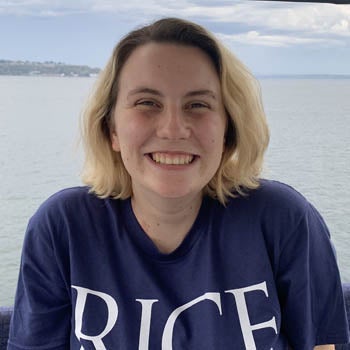Major: Ecology and Evolutionary Biology
Research Advisor: Adrienne Correa
“Being an ecology and evolutionary biology major engulfs you in a caring community of wonderful scientists,” said senior Jordan Sims. The down-to-earth and passionate students and faculty, combined with the numerous opportunities for students to get involved in research and outreach, made this major the perfect fit.
While Jordan has found all of the ecology and evolutionary biology faculty to be approachable and passionate about what they do, she identified Professor Scott Solomon as a particularly strong influence. “His intro biology course is the reason I found and switched to this major in the first place. Beyond being an excellent professor, he is a great mentor and friend. As my major advisor, he helped me to choose classes that explored my interests, while also providing me with a reasonable but challenging curriculum,” she said.
One of Jordan’s favorite experiences in her major was taking Tropical Field Biology, a summer field course that takes students to Belize. “We spent two weeks at different research stations in Belize—one week on a coral reef and one week deep in the rainforest,” she said. “We learned important field skills and experimental design. I am an aspiring marine biologist, and it was this course that taught me how to snorkel, identify corals and reef fish, and the methods that field biologists use to collect reproducible data. It was a truly life-changing experience.”

Jordan’s undergraduate research project in Dr. Adrienne Correa’s lab also had a focus on marine biology: studying how environmental stress affects coral reefs. “I look into the effects of nutrient enrichment on coral reproduction,” she explained. “Specifically I study the bacteria and algae that live inside of corals and how those microbial communities change in the face of environmental stress. I have also been studying if the changes we see in adult corals can be passed down to their offspring because this gives us a sense of the corals’ ability to persist in the face of global climate change.”
As a part of her work in the Correa lab, Jordan received two grants to fund a trip to Mo’orea, French Polynesia the summer after her sophomore year. She was able to design and execute an independent research project studying corals at a research station in the South Pacific, while also building necessary skills for her future and networking with reef scientists from around the world.
Given her love of nature and the outdoors, it may not be much of a surprise to hear that Jordan’s favorite parts of Houston are the dedicated green spaces. “It’s nice to live in a city because of the access it provides, but there are places very nearby that allow you to be surrounded by nature,” she said. “Rice has a pretty significant amount of green space—be sure to check out the pocket prairie if you come here! Just across the street from campus is Hermann Park, which contains the zoo, botanical gardens and lots of nature trails. A little further away, but still easily accessible, are the Houston Arboretum and Brazos Bend State Park. These are places you can go to disconnect from city life for a while without ever actually leaving the city.”
Outside of science, Jordan is also involved with several committees in her residential college, and she enjoys swimming, hanging out with her friends and watching paranormal investigator shows. She is also a talented musician, singing with an a cappella group and participating in musical theater productions on campus as an actor and musical director.
“My a cappella group, the Low Keys, is one of my favorite activities I have ever participated in. I joined as a freshman because I love to sing and have since been the music director for three years. That means I arrange and teach all of the music we perform. It’s a lot of work, but it keeps me in touch with my artistic side,” Jordan said.
As Jordan prepares to leave Rice to pursue a Ph.D. in Environmental Science and Policy, she is thankful for the supportive community she found at Rice. “There are ample resources at this school to allow you to do just about anything you set your mind to,” she said. “If you are struggling—or just need a little boost—you are completely surrounded by people who have the desire and ability to help you. There are support systems built into every aspect of your student life — within the residential colleges, your major and department, and campus-wide. The student body is respectful and uplifting, and faculty and staff want to see you succeed in whatever it is you decide to do.”

